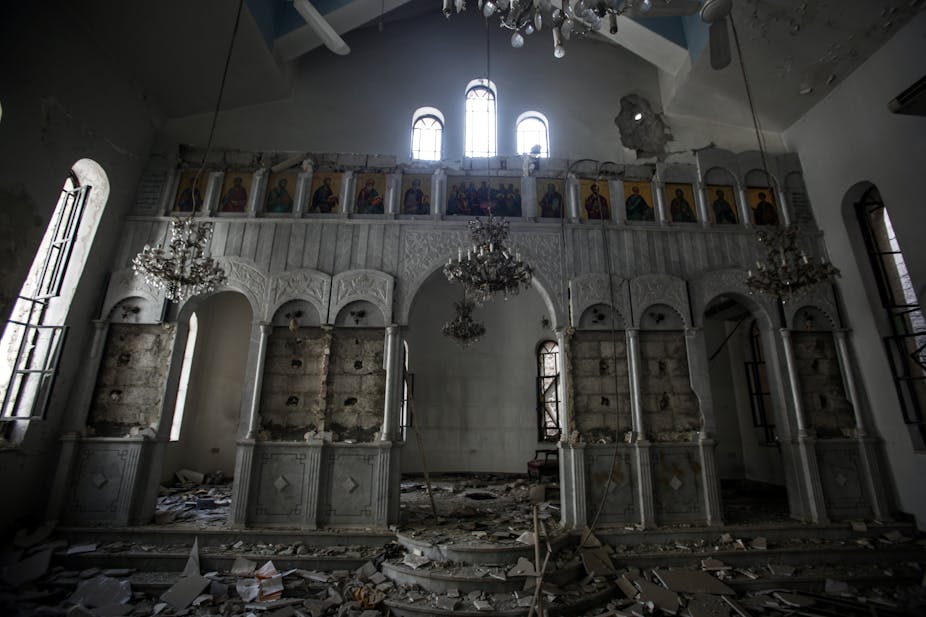The recent presidential executive order suspending the US refugee resettlement programme has been met with global criticism and concern. One aspect of it, the prioritisation of religious minority refugees, has been largely misunderstood. And instead of protecting religious minorities, the order may in fact pose greater risks to them.
The order states that once the resettlement programme restarts, the US will accept persecuted religious minorities from certain countries and then prioritise religious minorities over other refugees. It orders authorities to:
Prioritize refugee claims made by individuals on the basis of religious-based persecution, provided that the religion of the individual is a minority religion in the individual’s country of nationality.
The religious minority exception has been largely understood to refer only to Christian refugees because of comments Donald Trump made in an interview about Syrian Christians. However, the order does not specify any specific religious group and Christians are not necessarily going to be given priority in its enforcement.
The misunderstanding stems from claims that the religious minority exception will help make up the quota of Syrian Christian refugees disproportionately given asylum in the US. While only 1% of the US Syrian refugee intake were Christian in the 2016 fiscal year, Christians make up around 6-10% of the Syrian population. This is now a moot point, as the indefinite ban on accepting Syrian refugees also means Syrian Christians are currently excluded from the US.
Illegal, immoral and unpractical
The exception has been criticised on three grounds – legal, moral and practical. The legal argument is that accepting refugees is an obligation under international law that should be determined on humanitarian grounds. Morally, deciding whether to protect people from persecution based on nationality, race or religion alone is simply discriminatory.
However, religion has long been a factor in determining asylum claims. The 1951 Refugee Convention clearly states that a refugee is someone fleeing persecution on different grounds, including religious ones. In some cases, too, positive discrimination may be necessary in order to protect certain groups from extreme persecution, such as genocide.
Practical objections to the exception relate to national security concerns and the loss of religious plurality in the Middle East. The concern is that by identifying religious minorities as a priority, the US will be a target of religious violence by religious extremist groups at home – and religious minorities will be further persecuted in the Middle East region.
If some groups of refugees would be disproportionately favoured over others, religious extremists, such as Islamic State, could use this to exacerbate sectarian tensions. As definitions of “minorities” differ depending on the context, questions remain: will Muslim minorities be recognised and prioritised equally? Will the order actually help Baha’is in Iran, Yazidis in Iraq, or Rohingya Muslims in Burma in addition to Christian minorities?
Among refugee communities, too, increased sectarian tensions and religious violence have been fuelled by political rhetoric and responses to refugee admissions. In Germany, clashes between Christian and Muslim refugees resulted in calls for refugees to be separated based on religious affiliation. Yazidis have also faced attacks in refugee camps in Europe.

Back in the US, arguments that Christians are less likely to be a risk to national security than Muslims are factually wrong. Assumptions that Christians can assimilate better than Muslims to American society overlook the millions of Muslim individuals, families and communities who have fruitfully contributed to and lived in cities across the US since the birth of the nation.
The proposition that favouring Christians over other religious groups will help protect Christian communities around the world underestimates the nature and increasing politicisation of attacks against religious minorities in countries such as Syria and Iraq.
When religious identity matters
Undoubtedly, some religious groups have been specifically targeted around the world and are in need of urgent protection. Yet, religious identity alone does not predetermine whether someone is fleeing persecution. Whether an applicant is Christian, Muslim or otherwise, the need remains to demonstrate that they have fled from persecution, and the nature of that persecution. Priority should be based on who is in need of refuge. While religion can and does factor into this determination, it is not the only factor.
The continued focus of my own research has emphasised the importance of recognising the religious dimension to displacement. This includes identifying specific vulnerabilities and so at times I have argued the case for responding to the resettlement needs of certain groups or individuals differently. This is to recognise that not all refugees flee for the same reasons and not all experience displacement equally.
Religious minorities such as Druze, Christians, Yazidis, Baha'is and Zoroastrians, have long been recognised as being in need of specific protection when fleeing religious persecution. But none of this implies that entire groups of people are to be considered more or less “ideal” refugees if they have a particular religious affiliation. All people from a religious minority should not be included in refugee admissions so that other refugee populations can be excluded.
A climate of fear and hatred
My greatest concern over the religious minority exception is around the climate in which it has been created and the way in which it has been presented. The language of prioritising – and therefore excluding – certain groups of people feeds a discourse of hatred and fear. To some, this means that some refugees are more “deserving” of protection than others.
The climate of increasing populist hatred in North America can be used to mobilise and arm those who want to use difference to further their political or ideological interests. Refugees are now caught in the middle of this polarisation.
The point is simple: refugees fleeing war and refugees fleeing religious persecution are both in need of protection and assistance. Yet, how their protection needs are responded to may differ. The US cannot claim any moral authority in the world if it discriminates among those most in need of refuge.

